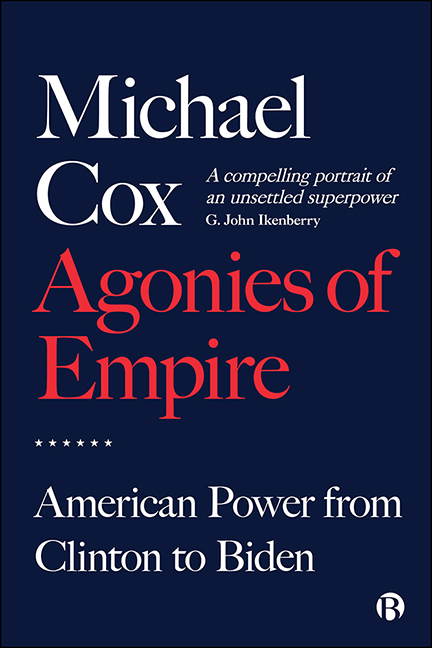Book contents
- Frontmatter
- Dedication
- Contents
- About the Author
- Preface
- Introduction: The Rise of an Empire
- PART I Clinton: Liberal Leviathan
- PART II Bush Jnr: Empire in an Age of Terror
- PART III Obama: Towards a Post-American World?
- PART IV Trump: Turbulence in the Age of Populism
- PART V Biden: Is America Back?
- Notes and References
- Acknowledgements
- Index
2 - The Wilsonian Moment? Promoting Democracy
Published online by Cambridge University Press: 15 September 2022
- Frontmatter
- Dedication
- Contents
- About the Author
- Preface
- Introduction: The Rise of an Empire
- PART I Clinton: Liberal Leviathan
- PART II Bush Jnr: Empire in an Age of Terror
- PART III Obama: Towards a Post-American World?
- PART IV Trump: Turbulence in the Age of Populism
- PART V Biden: Is America Back?
- Notes and References
- Acknowledgements
- Index
Summary
At the end of the two great wars that did so much to define America's position within the international system, American leaders talked in grandiloquent terms about a future world order based on international law, justice for all and liberal values. Just how seriously American policy makers took their own rhetoric has, of course, been the subject of a good deal of comment, and while supporters feel that US efforts to make the world a more enlightened place should be taken at face value, others have dismissed such pronouncements as so much rhetorical hot air. It was perhaps George Kennan, the ‘father of containment’, who more than anybody else, articulated the most persuasive critique of what he termed this ‘diplomacy of dilettantism’. In a far-reaching series of lectures delivered in the intellectual home of realism at the University of Chicago, Kennan did not pull his punches when it came to attacking those American leaders of the past – Woodrow Wilson most notably – who had always been inclined (he believed) to substitute hard thinking about the balance of power with idealistic statements about how the world ought to be, rather than how it was. In principle, there was nothing wrong with democracy as such or even promoting it. However, if the US defined this as its main goal, then this could easily lead to overreach at best, or at worst, conflict with those states which did not share American values. As one of Kennan's latter-day admirers put it, an American foreign policy ‘motivated largely by liberal ideals’ would very soon land the United States ‘in trouble’.
With the end of the Cold War, one might have predicted that this somewhat overheated debate would have died out. But this was not to be. Indeed, the apparent urge in some quarters to find a new post-Cold War ‘mission’ for the United States led to renewed speculation that America was once again succumbing to the old temptation of wanting to refashion the international system in its own liberal democratic image. George Bush Snr was more or less immune to this particular temptation. The same, it was argued, could not be said of his successor, William Jefferson Clinton.
- Type
- Chapter
- Information
- Agonies of EmpireAmerican Power from Clinton to Biden, pp. 23 - 39Publisher: Bristol University PressPrint publication year: 2022



